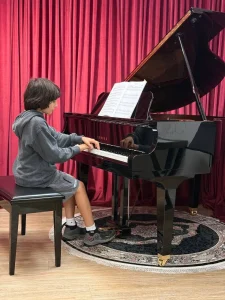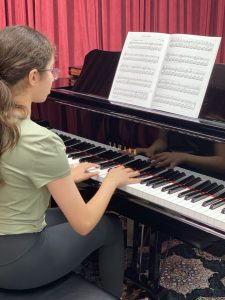For beginner musicians, it can be overwhelming to choose an instrument. It’s not just about picking a tool but finding a musical partner that syncs with who you are.
Enter the captivating world of music where selecting the perfect instrument is like finding a lifelong friend. This guide will help the beginning musician discover the instrument that truly speaks to his or hersoul. This special bond turns ordinary notes into heartfelt melodies, bringing musical aspirations to life.
3 Big Questions: Investment, Personality, and Long-Term Goals
Choose An Instrument—But Choose Wisely
To choose an instrument wisely means to take the process seriously. Most entry level instruments are affordable but you will still want to get the most from your money. Make no mistake, however: music, although taking money as well as time, is an investment that pays for itself a million times over. Learning to play music is good for the body, mind and soul, and most important of all—it’s fun. When you find the right instrument for you, it’s like finding a friend for life: someone you can have a conversation with, someone who will talk to you as well as listen. Most seasoned musicians have fond memories of their first instrument because they can see how far they came from that first step.
Musicians who have a lifetime of musical experience know how to choose an instrument wisely.
Many beginners wonder how to know which musical instrument is right for you, and the answer often lies in how you emotionally and physically respond to different instruments. You may naturally feel drawn to the warmth of a violin, the depth of a piano, or the energy of a guitar. Paying attention to which sounds inspire, calm, or excite you can make it much clearer which instrument truly fits your musical personality.
Emotions And Personality: An Instrument’s Soul
A profound connection with music is a deeply personal form of self-expression. When you choose an instrument, it should mirror your unique personality, emotions, and inner self. Consider the significance of music in your life and how you aim to convey your feelings through your instrument. Whether finding solace in the tender notes of a violin, where each resonance reflects your emotions, or immersing yourself in the heartfelt melodies of a saxophone that echo your innermost feelings, the instrument you choose to learn and enjoy should feel like an extension of yourself and what you want to say. Musicians speak with their instrument because their instrument helps them express what they want to say.
Think about what musicians you admire. Why do you like the music they make? Ask yourself how the instrument your favourite musician plays gives voice to emotion and personality—and then ask yourself if you want to do the same.
Musical Goals and Dreams
What are your musical goals? Do you want to become a professional musician, enjoy music for your own pleasure, or a bit of both? Your goals will help you choose an instrument that’s right for you. If you dream of performing on big stages, a piano or violin might be calling your name. A ukulele or guitar could be your perfect match if you’re looking for a more relaxed musical experience. These instruments offer an accessible and inviting way to express yourself through music while keeping things comfortable and enjoyable.
Do you like classical music more than rock or pop? Maybe you want to perform in a symphony one day? If so, choosing to learn electric guitar isn’t the best step—better to learn piano, violin, brass or woodwind instruments. If rock music is your style, however, put the flute away—pick up guitar, bass, a drum kit, or work on your singing style.
Knowing where you want to be prepares you to take your first step.
Many beginners also ask how to choose a musical instrument to learn, and the answer often becomes clearer once you think about the kind of musical life you hope to build. If you imagine yourself performing expressive solo pieces, an instrument like the piano or violin might feel right. If your dream is to play casually with friends or accompany your own singing, guitar or ukulele can offer a more relaxed and inviting path. When your musical goals are clear, choosing an instrument becomes a much more intuitive and inspiring process.
5 Practical Points to Think About Now
So, you’ve thought about music as an investment, as a way to express your emotions and personality, and what your goals and dreams in music are. These are big questions to think about and don’t need to be answered all at once! Learning music is a process, and an amazing part of that process is that as you learn and grow, you learn more about what you value, who you are and how you feel, and what you really want to do with your talent.
Aside from the three big questions, let’s talk about practical stuff that’s crucial for making a smart decision when you need to choose an instrument. These factors will help you choose an instrument that matches your goals and needs in the world of music. These considerations are like the building blocks for your musical journey, ensuring your chosen instrument fits perfectly.
Many students still wonder how to decide what instrument to play, even after thinking about their goals and personality. One of the most helpful steps is simply noticing how comfortable an instrument feels in your hands. The weight, the spacing of the keys or strings, and the way your body responds to the posture it requires can all influence your decision. Sometimes the physical connection you feel with an instrument offers the clearest guidance of all.
Age and Physical Considerations
Your age and physical abilities should play a significant role in your instrument selection process. Some instruments are better suited for children with smaller hands and developing motor skills, while others are more accommodating for adults with larger hands and more developed fine motor skills. For young beginners, instruments like the recorder or violin are often recommended because they are relatively easy to handle and learn. Moreover, training for violin is best for children because posture is so important for that instrument, and the earlier the exposure, the better.
Adults, on the other hand, may find joy in mastering instruments like the acoustic guitar or flute, which can be challenging for those with small or less strong hands. Drum kits, too, are typically only played by teenagers or older.
Budget and Cost
Before you embark on your musical journey, it’s essential to make a budget for yourself. Musical instruments come in a wide range of price points, so it’s crucial to align your choice with your financial resources. While there are high-end, premium instruments available, there are also budget-friendly options suitable for beginners. Deciding whether you prefer to rent an instrument, purchase a new one, or explore the realm of second-hand instruments can all be avenues to maximize the value of your budget.
Musical Background and Experience
Your prior experience with music plays a significant role in guiding you on choose an instrument. Beginners have a different set of options compared to experienced musicians seeking to expand their repertoire. If you’re venturing into the world of music for the first time, instruments like the keyboard or ukulele provide accessible entry points for learning the basics of music. These instruments are known for their user-friendly nature and can help you build a solid musical foundation.
On the other hand, if you already possess a foundation in music, you might feel prepared to embrace more intricate instruments, such as the trumpet or electric guitar, to broaden your musical horizons and explore advanced techniques. We really recommend that students do not reach too far beyond their skill level—this just leads to frustration.
Size and Portability
Practicality should not be overlooked when you choose an instrument. Consider whether you anticipate the need to transport your instrument frequently. The size and portability of an instrument can significantly impact its convenience in your life. (Just ask musicians who play tuba or double bass!) Some instruments are compact and designed for easy transport, making them suitable for musicians on the go or those with limited living space.
In contrast, other instruments may require dedicated space within your home due to their size and weight. If you lead a nomadic lifestyle or have limited living space, opting for a smaller instrument like a harmonica or a digital keyboard can emerge as the ideal, portable companion for your musical journey. This consideration adds an extra layer of convenience to your musical exploration, allowing you to seamlessly integrate your passion for music into your lifestyle, whether you’re on the move or comfortably at home.
Noise is important to consider, too. Think about your neighbours. Digital keyboards can be played with headphones—acoustic pianos can’t!
Maintenance and Care
Every instrument comes with its unique set of maintenance requirements. Reflecting on the time and effort you are willing to invest in nurturing and preserving your chosen instrument’s condition is crucial. Acoustic pianos need to be tuned, guitars need new strings, and saxophones need new reeds. Some instruments, however, such as the flute or recorder, typically demand less rigorous maintenance, making them suitable for individuals with busy schedules or those looking for a low-maintenance option.
In contrast, instruments like pianos and string instruments like the violin require regular tuning and attentive care to ensure they remain in optimal playing condition. A profound understanding of your instrument’s maintenance requirements empowers you to make a well-informed choice, allowing you to enjoy your musical journey without undue maintenance-related stress.
Instrument Families: Which One Is Right For You
Each family of instruments has a unique character and appeal. To help you decide which family you belong in, here’s a quick breakdown of the major characteristics of the popular instrument families.
String Instruments
String instruments introduce us to enchanting melodies, each with its own allure and sonic signature. Notable among them are the violin, viola, and cello, each capable of weaving a tapestry of emotions through unmatched expressivity. The violin, for instance, is celebrated for its ability to convey profound sentiments, evoking a wide range of feelings with its delicate yet powerful sound. In contrast, the cello boasts a deep and resonant timbre, capable of eliciting intense and heartfelt emotions. While these instruments are often associated with classical music, they possess a versatility that transcends genre boundaries, making them suitable companions for a diverse range of musical expressions, including folk and world music. String players are seen as having excellent ears and intonation, and are always in high demand.
For those inspired to begin, our violin lessons offer structured guidance and expert instruction to develop skills and confidence on this expressive instrument.
Wind Instruments
Wind instruments, such as the flute, clarinet, and saxophone, rely on the control of breath to craft mesmerizing melodies that float through the air. If the idea of creating music through the gentle power of your breath appeals to you, and you desire an instrument that offers versatility, exploring woodwind and brass instruments will be rewarding. These instruments require a delicate blend of technique and expression to produce ethereal sounds that resonate deeply with the listener’s emotions. These instruments are versatile, appearing in many genres of music, and often are important parts of ensembles and larger symphonies.
The Guitar Family
Without a doubt, the guitar has become the top three most popular instrument in the world. This is no accident. With a guitar you can accompany yourself as you sing, play in a band, and participate in a huge variety of different genres of music. Learning to play guitar helps you play bass and ukulele, too, opening a huge amount of musical options. The ukulele isn’t just for beginners, by the way. Over the past ten years this instrument has acquired a gigantic following.
At MiFa Music School, our guitar lessons provide students with structured guidance and hands-on instruction to help them progress confidently.
Percussion Instruments
Percussion instruments introduce rhythm to your musical repertoire, inviting you to infuse your compositions with vitality, vivacity, and boundless energy. Within this category, you’ll encounter the heartbeat of musical expression awith drums, xylophones, and djembes. If you find yourself inherently drawn to the art of rhythm, deriving immense joy from the intricate craftsmanship of beats and grooves, then the world of percussion may very well be your destined calling. It offers you a vibrant and pulsating avenue to express your musical spirit and creativity.
Melodic in nature, the handpan is nonetheless a highly percussive and rhythmical instrument, one that has exploded in popularity over recent years. The handpan offers an appealing balance between rhythm and melody, creating an experience that many musicians, young and old, are drawn to.
Keyboard Instruments
The piano opens the door to a rich and diverse tonal palette, beckoning musicians and enthusiasts alike to explore their musical passions. Whether your heart resonates with the classical masterpieces from centuries ago, the improvisational brilliance of jazz, the catchy melodies of pop, or the innovative realms of electronic music, keyboard instruments always have something to offer. Keyboard instruments grant you the power to create music with limitless potential, enabling you to explore and experiment with different musical genres and styles, providing you with the tools to express yourself fully in the world of music. Moreover, keyboardists are known to be highly knowledgeable and well-rounded as musicians; their instrument of choice is fundamental to many genres and traditions of music.
MiFa specializes in training new piano students, and we recommend that all our students have knowledge of the instrument. Our piano lessons in North Vancouver offer structured guidance and personalized instruction to help students develop skills and confidence at any level
Welcome to MiFa Music & Art School in North Vancouver
Okay! It’s easy to choose an instrument, right . . . ? Now, how about a music school?
As one of the top-rated music schools in North Vancouver, MiFa Music & Art School offers a diverse range of courses tailored to meet the unique interests and skill levels of our students. Our institution, marked by experience, passion, and unwavering commitment, invites individuals of all ages and abilities to become part of our ever-growing family. We take immense pride in helping students achieve their musical dreams, guided by our team of skilled and professional instructors.
Selecting the right instrument is just the first step of your musical journey. Equally important is choosing the right teacher and class to guide you. A knowledgeable instructor can help you develop proper technique, stay motivated, and reach your musical goals faster. Whether you prefer one-on-one lessons, group classes, or a combination of both, MiFa carefully matches students with instructors who inspire, challenge, and support them every step of the way—ensuring that your passion for music continues to grow long after you’ve chosen your instrument.
If you still have questions about how to choose an instrument that’s right for you, our instructors are happy to help. Book a consultation session, free of charge, to get your questions answered.
FAQ about Choosing the Right Musical Instrument
- How can I find the musical instrument that suits me best?
Finding the right instrument often comes down to a mix of personality, musical taste, and physical comfort. Some instruments might feel intuitive in your hands, while others inspire your creativity in unique ways. Pay attention to which sounds, textures, and playing styles excite you the most, and you’ll discover which instrument truly fits your style.
- What should beginners consider when picking an instrument to learn?
Beginners should think about ease of learning, their musical goals, and how much time they can dedicate to practice. Instruments like piano, guitar, or ukulele often provide quick rewards, while wind and string instruments might require more focus on technique initially.
- How do I decide which instrument to play if I like several options?
Consider factors like portability, practice space, cost, and the type of music you enjoy. Testing different instruments, either in a music store or during a trial lesson, can reveal which one feels most natural.
- Which musical instrument is best for long-term growth?
The best musical instrument for long-term development depends on your goals. Piano is excellent for building foundational skills in theory, rhythm, and harmony. Guitar and keyboard offer versatility, while wind and string instruments can deepen expressive technique and ensemble experience.





